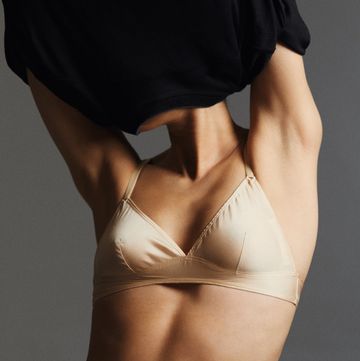Last week, the British government, currently led by our richest ever prime minister, announced that it now expects re-sale platforms such as eBay, Vinted and Depop to routinely inform HMRC how much people are earning from selling items.
'These new rules will support our work to help online sellers get their tax right first time. They will also help us detect any deliberate non-compliance, ensuring a level playing field for all taxpayers,' an HMRC spokesperson said.
The new move, which will target those using re-sale platforms as a way of making extra money, has caused outrage on social media, notably from young people and those from working-class backgrounds who particularly feel targeted. 'Money is tight, I use Vinted to sell old clothes, and I use it to cover my groceries or buy second-hand clothing. It just feels like the government is hitting the people struggling most,' Tyler, a student currently studying Fashion Promotion at The University of South Wales, tells ELLE.
For the working class, re-sale platforms are a lifeline. Perhaps now more than ever before due to inflation and the current cost of living crisis. Much like Tyler, throughout my twenties, I often re-sold items and used clothing rental sites to make ends meet while studying for my degree. Selling or renting a few things for twenty quid here and there would help me stay on top of my essential living expenses and household bills. As a working-class person, I've significantly depended on the additional income since graduating and living in London as I struggled to build my career in the fashion industry, which is notorious for its low pay and processes invoices at a glacial pace.
So what exactly has changed? Anyone earning over £1,000 gross trading income in the UK is obliged to report their earnings to HMRC, an obligation that's nothing new. It means that you can earn up to a total of £1,000 from self-employment or miscellaneous activity in a tax year, and won’t need to tell HMRC about it or pay tax on the income. Although remember you won’t get a separate allowance for each type of income. What has changed however, is that platforms like Depop, will be required to report information on sellers that have sales that exceed a certain threshold (€2000 or 30 sales in a calendar year). This impacts only a small proportion of Depop sellers - and, within this, it’s only those who make a profit from selling secondhand items that may be eligible for tax. The vast majority of sellers will see no impact from this change.
Sellers whose information is shared with HMRC will not necessarily be subject to tax. Only users making a profit from selling secondhand items may be impacted. For example, say you purchased items of clothing for a total of £3,500 in 2023 and sold them for £2,500 in 2024, Depop would have to report the £2,500 Depop fees to HMRC, but the seller would have no taxable income to report since the resale amount was less than the original purchase price. However, everyone’s situation is different. If you have questions about your taxable income, it’s best to seek financial advice if possible or contact HMRC directly.
As well as re-sell platforms helping those struggling financially, the government's decision has no doubt been informed by the growing popularity of sustainable and circular fashion platforms and rental sites. Just a few weeks ago, luxury clothing rental app HURR secured £7.9m in funding and since Love Island ditched its fast fashion sponsors for eBay in 2022, there were over 1,400% more searches for 'pre-loved fashion' on the marketplace, compared to the previous season.
Helena Davidson, a bookseller based in Tyne-on-Wear, has been using second-hand platforms for additional income while selling her old clothing that no longer fits due to recent weight gain. 'The money I've been making has really helped me because I barely earn 20k per year, and times are really tough right now,' she says. According to fin-tech company Finder, Davidson isn’t alone: research the company conducted in 2023 found that 44% of Brits have a side hustle outside of their employment.
There’s a general consensus that those from lower income backgrounds picking up additional income are being singled out, instead of placing stricter or higher tax rules for higher earners. 'Tax the rich more. They don't need another Rolls-Royce, but the people with less need to put food on the table,' Tyler adds.
'What worries me is that this decision will deter people from becoming resellers and discourage people wanting to adopt sustainable practices,' says former Love Island contestant and fashion sustainability advocate, Brett Staniland. 'The mere thought of having to do a self- assessment will drive people away, but most of all I worry for working-class folk who need their side hustles for extra pocket money. I’ll be savvier with reselling moving forward, a privilege I have with access to an accountant and friends with expertise in this area, but not everyone has that.'
As Staniland suggests, information by the recent ‘hustle tax’ decision has left many sellers bewildered and those from the lowest end of the income scale don’t have the funds to access financial advice. 'I don’t know if I’ll have to declare it as the information is confusing,' Davidson added. Worryingly, as Staniland feared, multiple sellers ELLE spoke to were considering abandoning second-hand selling altogether.
Financial confusion aside, what is clear, especially for those of us who currently work full-time, is that we shouldn’t have to adopt side hustles to make ends meet in the first place. If the government focused more on making sure our pay cheques matched up to a real living wage, many of us wouldn’t be forced to use resale platforms as a lifeline in the first place.
















